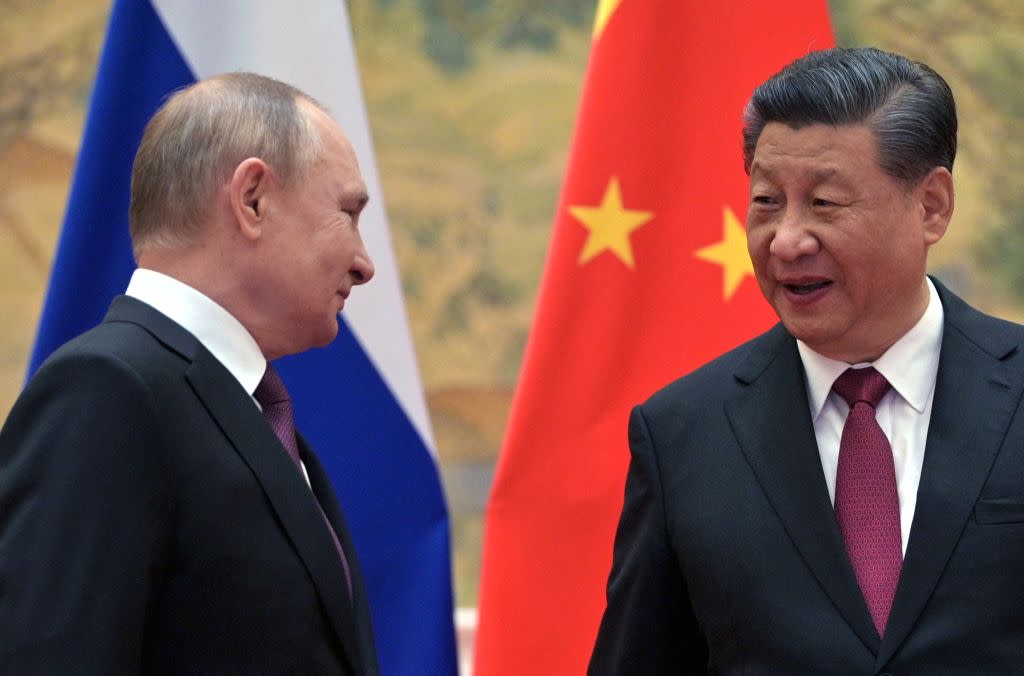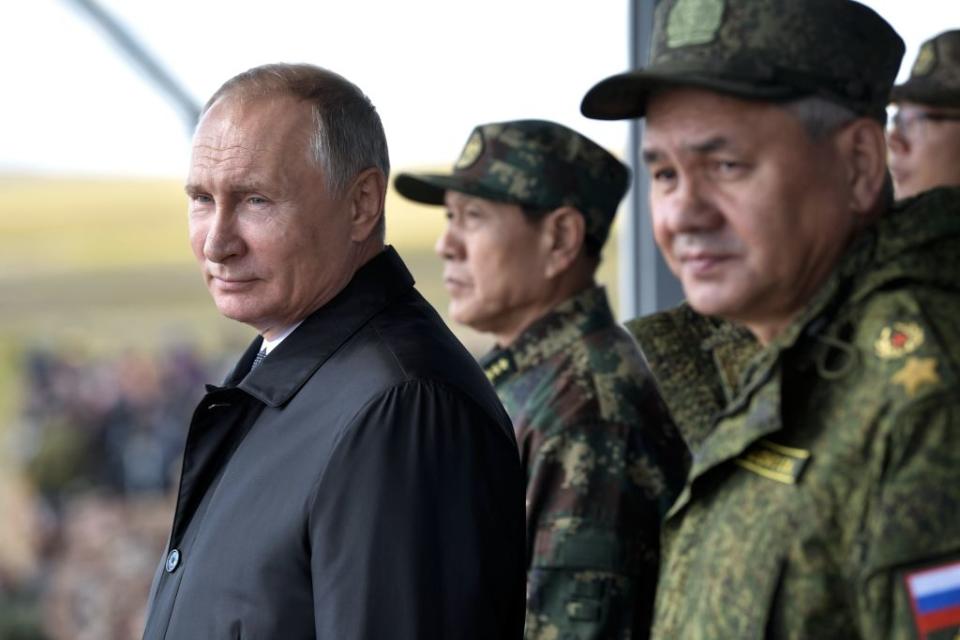China's Embrace of Putin Is Looking More and More Costly

- Oops!Something went wrong.Please try again later.
Russian President Vladimir Putin and Chinese President Xi Jinping arrive to pose for a photograph during their meeting in Beijing, on Feb. 4, 2022. Credit - Alexei Druxhinin—Sputnik/AFP/Getty Images
When Wang Jixian moved to the southern Ukrainian port city of Odessa, he didn’t expect to find himself in the middle of a war. But as the 37-year-old software engineer picked up his cellphone and began posting online the reality of life under Russian bombardment—wailing sirens, booming artillery, buskers on fretful streets—he soon found himself under attack from a more surprising quarter: the Chinese government and nationalist trolls, who objected to Wang’s stark portrayal of Russian aggression that chafed with Beijing’s official narrative.
Wang’s Weibo social media account was blocked for “spreading rumors” and strangers started issuing expletive-riddled threats on his Wechat account. “I’m dealing with a war on two fronts,” Wang told Voice of America. “The battlefield I’m faced with here is terrifying, but at least I can see the tanks. But the other battlefield lurking behind me is even scarier … I don’t know who’s in it, but they’re all telling me that they want me dead.”
Read More: China’s Support for Russian Aggression Toward Ukraine Confirms the West’s Worst Fears
China’s censorship of Wang and other independent voices on Ukraine underscores the contradictory position that the Beijing government has adopted since Russian President Vladimir Putin’s Feb. 24 assault on Ukraine: on one hand upholding sovereignty, territorial integrity, and the rules-based international order; on the other refusing to condemn Putin’s invasion nor even call it one.
“For a major power like China, which is poised to become the world’s largest economy in less than 10 years, the most important thing is to strike a balance,” says Zhou Bo, a retired PLA senior colonel and senior fellow at the Center for International Security and Strategy at Tsinghua University Zhou.
Over days and weeks of probing questions, China’s spokespeople settled on a line: The war is caused by NATO’s expansionism, which Russia is defending itself against. In an emailed statement March 18, China’s embassy in London said that Chinese President Xi Jinping spoke with Putin on the second day of the conflict and “expressed China’s hope to see Russia and Ukraine hold peace talks as early as possible.” Putin’s escalation since then—including the near total destruction of the eastern city of Mariupol—hardly indicates that he took Xi’s words to heart.
On April 1, Xi met E.U. leaders for a virtual summit with efforts to resurrect the stalled Comprehensive Agreement of Investment trade pact already facing pushback over allegations of forced labor and human-rights abuses in Xinjiang province. Refusal to help end the bloodshed in Ukraine just compounds the ill-feeling.
How much sway China has over Putin’s Ukraine invasion is a contentious matter. A Western intelligence report claimed that senior Chinese officials asked their Russian counterparts in early February to delay the invasion of Ukraine until after the Winter Olympics in Beijing. However, Qin Gang, the Chinese ambassador to the U.S., refuted that claim writing in the Washington Post March 16, saying “had China known about the imminent crisis, we would have tried our best to prevent it.”
Of course, figuring out China is like watching a magic show: sure, you can listen to the patter, but never take your eyes off the hands. And China’s actions reveal a cynical and risky gambit to back Vladimir Putin. Xi has often spoken of a world buffeted by “changes unseen in 100 years.” If Western sanctions targeting Russia’s economy, oligarchs and industry fail, it would confirm America’s decline as a superpower—and perhaps Xi would have less to fear from blowback were he to pursue his own strategic targets, such as reuniting self-ruling Taiwan.
But it’s looking increasingly likely that Beijing has its strategic calculus wrong. Putin’s offensive is foundering (for now, at least), and NATO has rarely been more united, as members announce a raft of defense spending hikes. A defeat for Putin just after he and Xi declared a “no limits” partnership in a high-profile meeting ahead of the Beijing Olympics would be an embarrassment for the Chinese Communist Party leader just as he is seeking a protocol-shredding third term. And in Putin, China has a “partner” with neither scruples nor, it’s becoming increasingly apparent, a sense of reality.
“It’s quite exposing for China,” says Kerry Brown, director of the Lau China Institute at King’s College, London. “It’s pushed a lot of decisions on them far quicker than they were expecting, making them declare their hand in ways where they don’t want to.”
The high cost of siding with Russia
Beijing’s initial approach was to deal with the crisis through inaction, on the assumption that you can’t punish inactivity. But things are happening on a scale in a speed that is compelling China into taking more proactive positions. On the one hand, China doesn’t want to align with Russia, which is antagonizing and angering Western countries who remain their biggest trade partners. But on the other, Beijing doesn’t want a continuation of American-led Western dominance, which it felt was already waning.
China was quick to refute reports that Russia had asked for military assistance. While it makes perfect sense for Putin to want to embroil China in his conflict, Beijing has more to lose than gain from actively assisting the invasion of Ukraine. And any help would mostly be symbolic—though China retains close military ties with Russia, with the two countries staging frequent joint-exercises including naval maneuvers in the Mediterranean and the Baltic seas—there’s little interoperability between their forces. Exercises in north-west China last year involving some 10,000 Russian and Chinese troops were the first to feature Russians using Chinese weapons and joint command-and-control. Coming down more heavily on the Russian side will entail huge costs, including risking tough sanctions and international boycotts. It doesn’t make much sense for Beijing to pay that for Russia, which they consider a regional power with a limited sphere of influence, whereas China today is a global player with interests on every continent—the only true rival to the United States.
Read More: How China’s Response to Russia’s Invasion of Ukraine Could Upend the World Order
“If China and Russia engage in a military alliance, the whole world would change,” says Zhou. “Western countries, no matter how strong their economic relationship with China, will definitely follow America and stand on their side. Then we inevitably will have two camps and a repetition of the Cold War. So it is extremely important for China to have this nonaligned relationship with Russia in spite of our friendship. And this is totally possible.”

Why Beijing won’t try to stop Putin
At the same time, if the West believes it can shame China into isolating Russia, it’s kidding itself. Beijing has for decades propped up an ossified, rogue nuclear state on its border because dealing with Kim Jong Un is calculated as preferable to a united, U.S.-allied Korean peninsula. If the threat of nuclear catastrophe combined with the plight of 25 million North Koreans subject to U.N.-designated “crimes against humanity” doesn’t sway China’s leaders, 4 million Ukrainian refugees won’t warrant a shrug. Beijing has proved it will only act in the purest traditions of self-interest. And so, it’s doubtful that Beijing will suddenly oppose Putin as he attempts to carve up the world into spheres of influence, with NATO, and America’s role severely diminished.
In this sense, joining Western sanctions are contrary to China’s self-interest, given that handing NATO an easy victory would reenergize a newly confident, united, America-led Western alliance. China wants a less-confident, less-zealous West to deal with, and more unity and purposefulness spells trouble. “Russia is causing that to happen,” says Brown. “But it’s still not a solution for China to align with the West as that actually brings about the very thing that it doesn’t want. It just shows this rather torturous position they’re in.”
It’s also likely that the West is inflating the clout Beijing has over the Kremlin to distract from its own culpability. China has little demand for Russian products other than oil and gas. True, bilateral trade rose 33.6% year-on-year to some $140 billion in 2021, when Russia was China’s second largest crude oil supplier, accounting for some 15.5% of China’s total imports. But the 10 billion cubic meters of gas China purchased in 2021 is dwarfed by the 175 billion cubic meters Russia sold to Europe over the same period. For leverage over Russia’s economy, European leaders should look closer to home.
Ultimately, it’s a war that looks unwinnable, while perpetually muddying China’s international reputation, stirring up antagonism in Washington and Europe. None of that speaks to China’s interest, being the self-appointed global superpower in waiting. And while China may be winning the domestic propaganda war for now, voices like Wang’s in Odessa—who has more than 100,000 subscribers on Youtube—will get louder as the war drags on and more people ask questions. “[Ukrainians] are fighting for their homes …Why should they be bombed?” he posted March 4. “It’s just that simple; it’s got nothing to do with NATO. People just want to be able to live their lives.”

